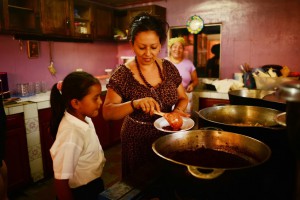Lunch with Las Tías and Excel
Yesterday I spent the afternoon discussing the merits of an excel spreadsheet developed by the CDC to assist school nurses in the US to track the obesity rates of their students. But, given that I am in Nicaragua, where our partner organization, Las Tías, Serves a vulnerable population of children from León, our focus was on malnutrition rather than obesity.
I was meeting with Magno, principal of the adolescent program here, along with Sandra and Griselda, principal and second in command respectively a the youth facility. We sat around one computer monitor and talked about the data Las Tías currently tracks on their students.
After launching our second international partnership with Las Tías last year, Spark has been working to establish a set of metrics to serve as indicators of success for each partner, with the goal of finding indicators that will be applicable in both Nicaragua and Zambia. Body Mass Index (BMI) is one of those internationally recognized indicators that we have identified as valuable & comparable.
Las Tías, similar to our Zambian partner, understands the important connection between good nutrition and the ability to perform well in school. That’s why they emphasize the importance of their meal program, which ensures each student in their program receives a nutritious lunch (yesterday was fish with rice and a salad with lettuce, tomatoes and beets). With this critical program in place, they track their success in part by measuring the BMI of each student at the outset of each school year, as well as at the close, tracking the change and the impact of their work.
As we spoke yesterday, Griselda pulled out multiple manilla folders to show me the robust information they maintain on each of the students in their programs. And this is where the excel spreadsheet comes in…
Digitizing the information Las Tías collects, with an easy to use workbook, eliminates the extensive manual plotting of each student’s height & weight on a paper rubric organized by age. A digital process will save the already busy educators time they previously spent transcribing data collected and calculated on paper into a typed table. By streamlining the process, the risk of human error is also reduced, giving Las Tías and Spark more confidence in the quality of the data collected. A small step forward, but a clear example of how Spark works in collaboration with our partners to support and improve their important work serving the children in their communities.
-Stephanie






